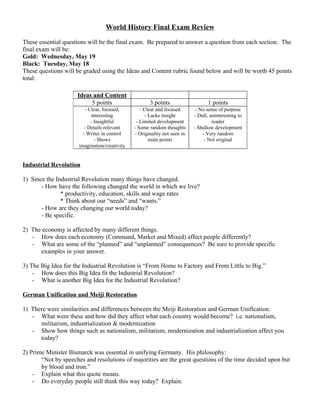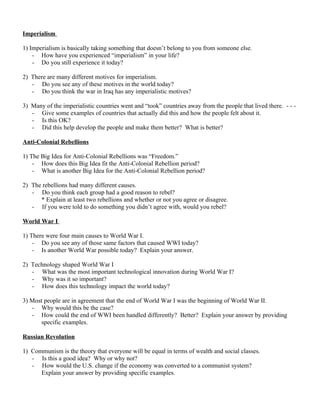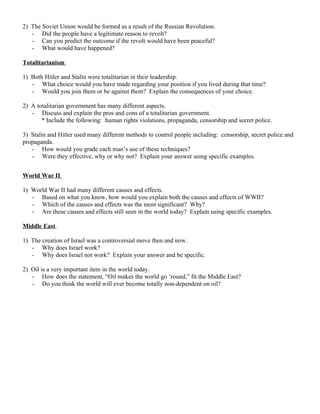2nd semester eq final review (spring 2010)
- 1. World History Final Exam Review These essential questions will be the final exam. Be prepared to answer a question from each section. The final exam will be: Gold: Wednesday, May 19 Black: Tuesday, May 18 These questions will be graded using the Ideas and Content rubric found below and will be worth 45 points total: Ideas and Content 5 points 3 points 1 points - Clear, focused, - Clear and focused - No sense of purpose interesting - Lacks insight - Dull, uninteresting to - Insightful - Limited development reader - Details relevant - Some random thoughts - Shallow development - Writer in control - Originality not seen in - Very random - Shows main points - Not original imagination/creativity Industrial Revolution 1) Since the Industrial Revolution many things have changed. - How have the following changed the world in which we live? * productivity, education, skills and wage rates * Think about our ŌĆ£needsŌĆØ and ŌĆ£wants.ŌĆØ - How are they changing our world today? - Be specific. 2) The economy is affected by many different things. - How does each economy (Command, Market and Mixed) affect people differently? - What are some of the ŌĆ£plannedŌĆØ and ŌĆ£unplannedŌĆØ consequences? Be sure to provide specific examples in your answer. 3) The Big Idea for the Industrial Revolution is ŌĆ£From Home to Factory and From Little to Big.ŌĆØ - How does this Big Idea fit the Industrial Revolution? - What is another Big Idea for the Industrial Revolution? German Unification and Meiji Restoration 1) There were similarities and differences between the Meiji Restoration and German Unification. - What were these and how did they affect what each country would become? i.e. nationalism, militarism, industrialization & modernization - Show how things such as nationalism, militarism, modernization and industrialization affect you today? 2) Prime Minister Bismarck was essential in unifying Germany. His philosophy: ŌĆ£Not by speeches and resolutions of majorities are the great questions of the time decided upon but by blood and iron.ŌĆØ - Explain what this quote means. - Do everyday people still think this way today? Explain.
- 2. Imperialism 1) Imperialism is basically taking something that doesnŌĆÖt belong to you from someone else. - How have you experienced ŌĆ£imperialismŌĆØ in your life? - Do you still experience it today? 2) There are many different motives for imperialism. - Do you see any of these motives in the world today? - Do you think the war in Iraq has any imperialistic motives? 3) Many of the imperialistic countries went and ŌĆ£tookŌĆØ countries away from the people that lived there. - - - - Give some examples of countries that actually did this and how the people felt about it. - Is this OK? - Did this help develop the people and make them better? What is better? Anti-Colonial Rebellions 1) The Big Idea for Anti-Colonial Rebellions was ŌĆ£Freedom.ŌĆØ - How does this Big Idea fit the Anti-Colonial Rebellion period? - What is another Big Idea for the Anti-Colonial Rebellion period? 2) The rebellions had many different causes. - Do you think each group had a good reason to rebel? * Explain at least two rebellions and whether or not you agree or disagree. - If you were told to do something you didnŌĆÖt agree with, would you rebel? World War I 1) There were four main causes to World War I. - Do you see any of those same factors that caused WWI today? - Is another World War possible today? Explain your answer. 2) Technology shaped World War I - What was the most important technological innovation during World War I? - Why was it so important? - How does this technology impact the world today? 3) Most people are in agreement that the end of World War I was the beginning of World War II. - Why would this be the case? - How could the end of WWI been handled differently? Better? Explain your answer by providing specific examples. Russian Revolution 1) Communism is the theory that everyone will be equal in terms of wealth and social classes. - Is this a good idea? Why or why not? - How would the U.S. change if the economy was converted to a communist system? Explain your answer by providing specific examples.
- 3. 2) The Soviet Union would be formed as a result of the Russian Revolution. - Did the people have a legitimate reason to revolt? - Can you predict the outcome if the revolt would have been peaceful? - What would have happened? Totalitarianism 1) Both Hitler and Stalin were totalitarian in their leadership. - What choice would you have made regarding your position if you lived during that time? - Would you join them or be against them? Explain the consequences of your choice. 2) A totalitarian government has many different aspects. - Discuss and explain the pros and cons of a totalitarian government. * Include the following: human rights violations, propaganda, censorship and secret police. 3) Stalin and Hitler used many different methods to control people including: censorship, secret police and propaganda. - How would you grade each manŌĆÖs use of these techniques? - Were they effective, why or why not? Explain your answer using specific examples. World War II 1) World War II had many different causes and effects. - Based on what you know, how would you explain both the causes and effects of WWII? - Which of the causes and effects was the most significant? Why? - Are these causes and effects still seen in the world today? Explain using specific examples. Middle East 1) The creation of Israel was a controversial move then and now. - Why does Israel work? - Why does Israel not work? Explain your answer and be specific. 2) Oil is a very important item in the world today. - How does the statement, ŌĆ£Oil makes the world go ŌĆśround,ŌĆØ fit the Middle East? - Do you think the world will ever become totally non-dependent on oil?


